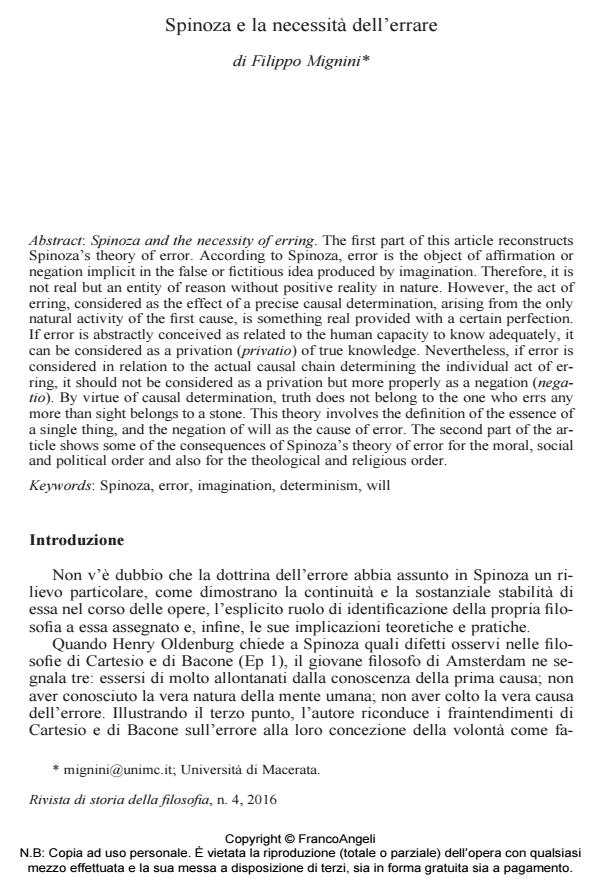Spinoza e la necessità dell’errare
Titolo Rivista RIVISTA DI STORIA DELLA FILOSOFIA
Autori/Curatori Filippo Mignini
Anno di pubblicazione 2016 Fascicolo 2016/4
Lingua Italiano Numero pagine 19 P. 693-711 Dimensione file 61 KB
DOI 10.3280/SF2016-004009
Il DOI è il codice a barre della proprietà intellettuale: per saperne di più
clicca qui
Qui sotto puoi vedere in anteprima la prima pagina di questo articolo.
Se questo articolo ti interessa, lo puoi acquistare (e scaricare in formato pdf) seguendo le facili indicazioni per acquistare il download credit. Acquista Download Credits per scaricare questo Articolo in formato PDF

FrancoAngeli è membro della Publishers International Linking Association, Inc (PILA)associazione indipendente e non profit per facilitare (attraverso i servizi tecnologici implementati da CrossRef.org) l’accesso degli studiosi ai contenuti digitali nelle pubblicazioni professionali e scientifiche
The first part of this article reconstructs Spinoza’s theory of error. According to Spinoza, error is the object of affirmation or negation implicit in the false or fictitious idea produced by imagination. Therefore, it is not real but an entity of reason without positive reality in nature. However, the act of erring, considered as the effect of a precise causal determination, arising from the only natural activity of the first cause, is something real provided with a certain perfection. If error is abstractly conceived as related to the human capacity to know adequately, it can be considered as a privation (privatio) of true knowledge. Nevertheless, if error is considered in relation to the actual causal chain determining the individual act of erring, it should not be considered as a privation but more properly as a negation (negatio). By virtue of causal determination, truth does not belong to the one who errs any more than sight belongs to a stone. This theory involves the definition of the essence of a single thing, and the negation of will as the cause of error. The second part of the article shows some of the consequences of Spinoza’s theory of error for the moral, social and political order and also for the theological and religious order.
Parole chiave:Spinoza, error, imagination, determinism, will
- Spinoza e le sei storie di Adamo: teoria della narrazione e polisemia dei testi Marta Libertà De Bastiani, in RIVISTA DI STORIA DELLA FILOSOFIA 4/2023 pp.684
DOI: 10.3280/SF2022-004004
Filippo Mignini, Spinoza e la necessità dell’errare in "RIVISTA DI STORIA DELLA FILOSOFIA" 4/2016, pp 693-711, DOI: 10.3280/SF2016-004009